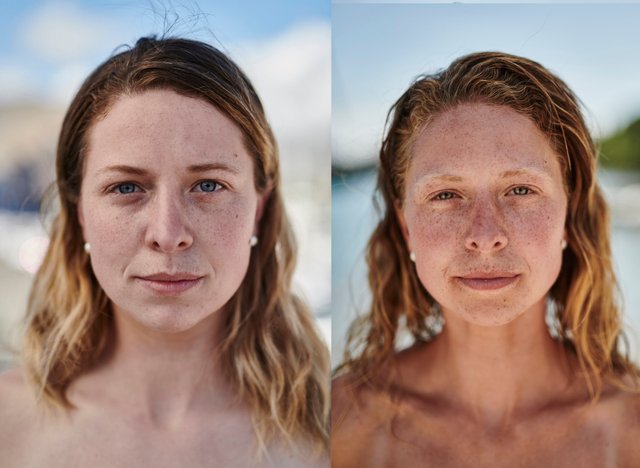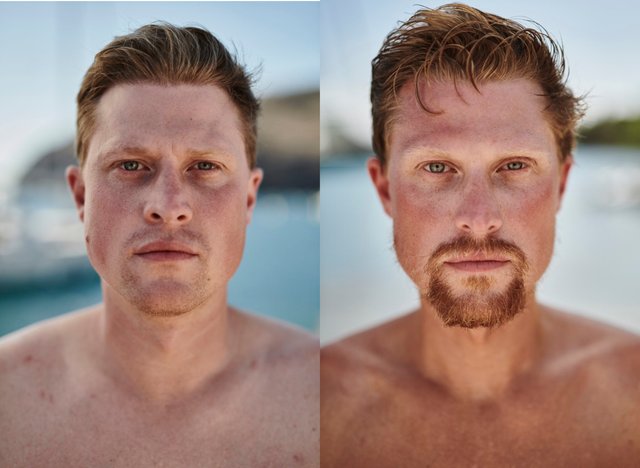Sunlight breaks down plastic, fades colors, heats things up - which causes breakdown in materials, and damages living creatures like us.
Let's look at the 4 people pictured below. Try to answer these questions:
- Are any of them relatives?
- Who's older and who's younger?


Well, actually, there are only two people, and they are siblings. These before-and-after photos of the brother-and-sister team of Anna and Cameron McLean, who rowed across the Atlantic in 43 days, 15 hours and 22 minutes, and kept in contact with their support network using Microsoft Teams (but that's an aside) were taken before and after the race. This is what that many days of 24-hour exposure, especially sun and wind, can do to you: crinkled, lighter-colored hair; darker, tougher skin; things like freckles can become more prominent; blemishes; sunburn; lightening of the irises; aged appearance; and let's not forget the increased risk of skin cancer. If you're out there long enough, the toughening of the skin becomes permanent and wrinkles form. People who do outdoor sports, such as mountain-climbing, rappelling, skiing, and surfing face the sunlight challenge all the time.
I suppose it's great if you actually want to alter your appearance somewhat. Perhaps you can't get into a bar because you look too young, or maybe you just want to attract people who are not so young. Not so great if you're a spy who needs to quickly alter your appearance, though!
There are things you can do to rejuvenate your skin on a daily basis. Take an aloe vera leaf, remove the barbs and cut the leaf open or squeeze them out, or buy some pure aloe vera gel at the store, and use the gel inside the leaf all over your damaged skin, even sunburns and burns. Since aloe vera moisturizes and speeds up healing, I guess it won't hurt your hair. I wouldn't put it on your eyeballs, though! ;)
Be careful about lotions - some will help and others will hurt, but most don't help repair sunburn and burns. Lotions, also, can be painful on open wounds and in your eyes.
An even better choice is preventive measures: wear sun-blocking clothes, a wide-brimmed hat and sunglasses, and slather sun-blocking lotion onto your exposed skin. Ironically, staying indoors all the time is NOT an option, because you MUST have direct sunlight to create vitamin D. To do this, go out in the morning or towards evening for 15-30 minutes when the position of your location is at a sharp enough angle to the Sun that the power of the sunlight is diminished by the atmosphere. And, of course, when you're out in the elements, make sure to drink enough water. If you're working hard and sweating a lot, water isn't enough because you're sweating out electrolytes. Avoid beverages like coffee, caffeinated tea, soda and other crap beverages and, instead, reach for an electrolytic drink. Gatorade and Powerade are probably the most famous options in the US, but they're not the only ones or the best. There are now lots of choices, but you have to be careful to look at what's in them! I recommend Body Armor and Pedialyte. If you want to prepare something yourself, read this. How much you should drink is based on a combination of your size, how active you are and how much you're sweating. You also have to pay attention to early warning signs of dehydration: flushed face, confusion, dizziness, fatigue, stumbling, nausea, and cramps. It's better to pre-hydrate than drink when you have symptoms!
I know a lot of people drink electrolytic beverages like it's safe for consumption at any time, but it isn't. Electrolytic beverages should be used to keep you hydrated when you're sweating because using them at other times can have potentially negative consequences for certain internal organs.
And, remember, too much water (hyperhydration) is almost as bad as too little. You have to be proactive about drinking, or you'll end up dehydrated, with heat exhaustion or, even worse, heat stroke.
If you appreciate this article, please 🏅upvote/like👍 , 🤩resteem/share
, 🤩resteem/share and share it to Facebook
and share it to Facebook , Twitter
, Twitter , Reddit
, Reddit , LinkedIn
, LinkedIn and wherever else
and wherever else you can!
you can!